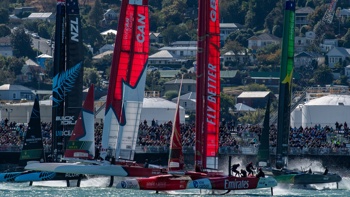UPDATED: 8.32AM Helen Clark's been in top form at the UN as she undergoes what's being billed as the world's most public job interview.
Our former Prime Minister has been grilled for around two hours by member states on her bid to become UN Secretary-General.
WATCH ABOVE: Helen Clark's pitch for Secretary-General job
She drew more questions than any other of the eight candidates who have presented so far.
Clark strenuously denied she was an "establishment candidate" to become next Secretary General.
Margaret Besheer: Clark seen as the 'establishment' UN candidate
"I have never been an establishment candidate for anything," she said in response to the representative from St Vincent and Grenadines who suggested that because she was a household name, she could be seen as the establishment candidate.
"I have come from the outside of everything I have done, from a rural background to urban settings, as a woman breaking into a man's world, which was politic in my country, as a woman becoming the first elected Prime Minister, the first woman appointed Administrator of the United Nations Development Programme.
"I don't think in all honesty anyone could see me as an establishment candidate because I've come from out of the box and I'll always be a bit out of the box in looking at how to, in my work, create a ladder of opportunity for others to be included and to have a fair go based on their abilities."
She's told the UN member states that the UN absolutely has a role to advocate for the full inclusion of all peoples in their societies in every form.
Clark said New Zealand has been through a painful and searching process over decades .
"And often there are issues that have to be faced which people don't understand very well, and there's always the possibility of back lash, but it has to be done, because in the end people have to live together."
Clark said she views it as a priority issue in achieving peace and harmony in societies and ensuring no one's left behind.
She said she grew up in a society that prioritised opportunity and fairness for everybody.
"And throughout my life I've done my best to find ways to overcome injustice and inequality where I have encountered them."
The United Nations needs a proven leader who's pragmatic and effective, said Clark.
She's shown those qualities during nine years as a Prime Minister and seven years as an administrator.
"Coming from New Zealand shapes who I am, and what I have to offer. I come from a highly culturally-diverse country, in a region of great diversity."
Chris Lynch Interview: Helen Clark's bid for top UN post
MORE: UN Secretary-General race has begun
In response to a question about women's rights in her bid to become Secretary-General of the organisation, Clark told the United Nations she has spent her whole life breaking glass ceilings.
Our former Prime Minister hopes other women will follow her lead and also pass through the shards of glass.
"To take their position as full and equal participants in societies, politics, economies with equal rights and opportunity under the law."
Clark said no one in the 21st century should have to fight to gain equality as a woman - that right should be guaranteed.
The current head of the UN Development programme wants to look at what's driving the issues.
She said there's the flight from poverty, the flight from fear and conflict.
Clark said it's important to look at what's really behind this problem.
"We all know what is happening. Now we need to focus on what we are doing about it and to shift the focus from solving problems after they have arisen, to helping to prevent them from occurring."
When asked what she thought about the regional rotation of the Secretary General's job - Eastern Europe believes it is its turn - she suggested the job should go to the best person.
"I responded to the invitation from the presidency of the General Assembly and president of the Security Council which went to all member states to put their best candidates forward.
"I think given the challenges our world faces today, the General Assembly and Security Council should have before them the full range of talent available for the job.
"It's your decision. You make it. That's the spirit in which the New Zealand Government has nominated me."
Clark told the General Assembly in New York that there's a security approach to dealing with terrorism, which she doesn't shrink from.
"But there's also most definitely a developmental approach to it. We need to look at what drives recruitment for these groups."
Clark thanked the president of the UN and all who attended and for the seriousness of their questions.
"I've taken a number on notice because of the volume of them and the depth and complexity of them. And I look forward to gauge with you over the next weeks and months. Thank you."
Labour’s foreign affairs spokesman David Shearer said the fact Clark was grilled more than other candidates could be down to General Assembly representatives becoming more used to the process as it went on.
“She certainly got some tough questioning...she is seen as a front-runner, and as a front-runner you are going to get more scrutiny than perhaps others will. I think she handled it all really well, I think the way she came across was fine.”
Correspondent Jack Tame was in the audience as she pitched her credentials for the Secretary-General's job.
Jack Tame: Helen Clark's bid to be the next UN Secretary General
But he's told Andrew Dickens that competency's just a small part of the equation.
"She would have to be if not the strongest, certainly amongst the strongest candidates here. Her competency, credentials are only a part of the equation that that decides the next Secretary-General."
Tame said geo-politics is more important - you need to be supported by the big five countries - Russia, the US, China, France and the UK.
Clark answered 'yes' when asked if she thought the UN had lost credibility over the past few years, telling delegates that in the court of public opinion the body could act more authoritatively, Tame said.
"She emphasised her history in New Zealand, and on an international stage in leadership positions, both as the UN DP and of course, her time as New Zealand Prime Minister."
Voice of America's Margaret Besheer told Andrew Dickens Clark was impressive.
"She certainly is a front runner and she is in a very good position after today."
Besheer believes Clark's main rival is the former Prime Minister of Portugal, Antonio Guterres.
She said some countries have an idea of who they want already but others are still thinking about it.
"We have nine in the race now but there's going to be more entrants probably at least two or three more entrants so it depends on who those people are whether that could change the landscape"
Edward Mortimer, the former communications director to the Kofi Annan, said it's embarrassing that ALL eight previous incumbents have been male.
He said a lot of people will be disappointed if a woman can't be found to do the job ... but gender shouldn't be the over-arching consideration.
"The most important thing is not the gender, or the nationality but whether you have the qualifications to do it."
Mortimer said today's globally broadcast interviews may not be the end of the exercise.
"The Russians in particular insisted that there shouldn't be an absolute deadline or cut off date and the Security Council will not start discussing the matter until July."
He said this three day exercise is important and valuable, but won't necessarily be where the final decision is made.
Take your Radio, Podcasts and Music with you









